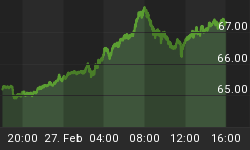Verge of a Bond Market Shutoff
The Chicago Board of Education is on the verge of a bond market shutoff.
On January 27, the CBOE Canceled an $875 Million Bond Offering due to hostile conditions. At that time, I commented "Will the yields be any lower tomorrow? Next week? Why?"
Today, we have the answer: Chicago Public Schools Gets Sale Done at Big Penalty.
Battered by negative headlines about its solvency, labor troubles, and a state takeover threat, the Chicago Board of Education returned to the market Wednesday after a one-week delay to price a scaled-down deal that offered a hefty high yield of 8.50%.
The district initially planned last week to offer $875 million of general obligation paper, including $795 million in a tax-exempt tranche and $80 million of taxable securities.
The final offering run by JPMorgan was sized at $725 million and came entirely as tax-exempt. CPS [Chicago Public Schools] appeared to have dropped the taxable piece while the yield on the deal's long bond shot up by 75 basis points over what CPS had been aiming for last week.
"The numbers suggest they are on the brink of losing market access," said Richard Ciccarone, president of Merritt Research Services. "The numbers suggest there is a lot of doubt about whether CPS can find a method and means to solve its financial problems. Can this be a catalyst to bring together what looks like a polarized political situation?"
More Unsavory Details
- The 8.50% yield on the 28-year bond landed 580 basis points over the Municipal Market Data's top-rated benchmark for a similar maturity and nearly 500 basis points over a BBB credit.
- The yield on the 10-year maturity landed 607 basis points over a similar top-rate maturity and 515 basis points over a BBB credit.
- Fitch Ratings, Standard & Poor's, and Moody's Investors Service have the district deep in speculative-grade territory with single-B level ratings.
- The deal received a BBB rating from Kroll Bond Rating Agency.
- The preliminary price on the taxable, 17-year maturity, completely axed from this week's deal, offered a yield of 9.75% with a coupon of 9.50%.
- About $393 million was to reimburse the district for money already spent.
Rate Shopping Whores
Please note the ludicrous BBB rating by the Kroll Bond Rating Agency.
That rating is a signal that Kroll wants all the business it can get and is willing to provide nonsensical ratings to get that business. This is precisely what happened with ratings in the housing crash.
For more details please see Rate Shopping Whores and Chicago's Bond Rating.
Origin of Rate Shopping
Originally, it did not work like this. And I have been harping about the underlying problem for years. A good starting point is my September 28, 2007 post Time To Break Up The Credit Rating Cartel.
Here is a recap.
The rating agencies were originally research firms. They were paid by those looking to buy bonds or make loans to a company. If a rating company did poorly it lost business. If it did poorly too often it went out of business.
Low and behold the SEC came along in 1975 and ruined a perfectly viable business construct by mandating that debt be rated by a Nationally Recognized Statistical Rating Organization (NRSRO). It originally named seven such rating companies but the number fluctuated between 5 and 7 over the years.
Establishment of the NRSRO did three things (all bad):
- It made it extremely difficult to become "nationally recognized" as a rating agency when all debt had to be rated by someone who was already nationally recognized.
- In effect it created a nice monopoly for those in the designated group.
- It turned upside down the model of who had to pay. Previously debt buyers would go to the ratings companies to know what they were buying. The new model was issuers of debt had to pay to get it rated or they couldn't sell it. Of course this led to shopping around to see who would give the debt the highest rating.
Instead of rating agencies getting paid on the basis of how well they rated debt, the rating agencies got paid on how favorably they rated debt!
On May 18, 2015 I put together a table of how various rating agencies rate Chicago debt. This is what it looked like at the time.
| Rating Agency | Date | Rating | Level | Outlook |
| S&P | 5/14/2015 | A- | 3 Levels Above Junk | Negative |
| Kroll | 5/11/2015 | A- | 3 Levels Above Junk | Stable |
| Fitch | 5/15/2015 | BBB+ | 3 Levels Above Junk | Negative |
| Moody's | 5/12/2015 | Ba1 | Junk | Negative |
| Egan-Jones | 5/18/2015 | "Deep Into Junk" | Negative |
Egan-Jones ratings from phone conversation with Sean Egan.
How To Gain Market Share
Gaining market share is easy. All you have to do is give a higher rating than anyone else.
Regardless of what rating anyone assigns Chicago debt, the Chicago public school system is in deep, deep trouble. Bankruptcy is the only sensible solution.















